The AMD Threadripper 2990WX 32-Core and 2950X 16-Core Review
by Dr. Ian Cutress on August 13, 2018 9:00 AM ESTHEDT Benchmarks: Encoding Tests
With the rise of streaming, vlogs, and video content as a whole, encoding and transcoding tests are becoming ever more important. Not only are more home users and gamers needing to convert video files into something more manageable, for streaming or archival purposes, but the servers that manage the output also manage around data and log files with compression and decompression. Our encoding tasks are focused around these important scenarios, with input from the community for the best implementation of real-world testing.
Handbrake 1.1.0: Streaming and Archival Video Transcoding
A popular open source tool, Handbrake is the anything-to-anything video conversion software that a number of people use as a reference point. The danger is always on version numbers and optimization, for example the latest versions of the software can take advantage of AVX-512 and OpenCL to accelerate certain types of transcoding and algorithms. The version we use here is a pure CPU play, with common transcoding variations.
We have split Handbrake up into several tests, using a Logitech C920 1080p60 native webcam recording (essentially a streamer recording), and convert them into two types of streaming formats and one for archival. The output settings used are:
- 720p60 at 6000 kbps constant bit rate, fast setting, high profile
- 1080p60 at 3500 kbps constant bit rate, faster setting, main profile
- 1080p60 HEVC at 3500 kbps variable bit rate, fast setting, main profile
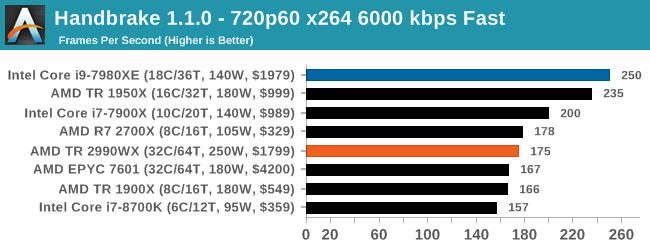
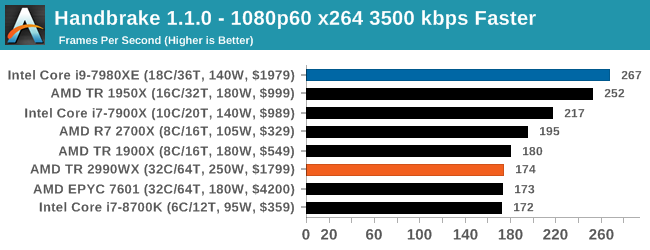
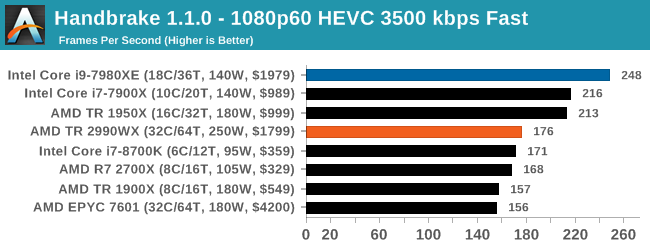
Video encoding is always an interesting mix of multi-threading, memory latency, and compute. The Core i9, with AVX2 instructions, sets a commanding lead in all three tests. The AMD processors seem to fluctuate a bit, with the 1950X and 2700X being the best of the bunch. Unfortunately we didn’t get 2950X results in our initial runs, but I would expect it to be competitive with the Core i9 for sure, given where the 1950X is. However the 2990WX does fall behind a bit.
7-zip v1805: Popular Open-Source Encoding Engine
Out of our compression/decompression tool tests, 7-zip is the most requested and comes with a built-in benchmark. For our test suite, we’ve pulled the latest version of the software and we run the benchmark from the command line, reporting the compression, decompression, and a combined score.
It is noted in this benchmark that the latest multi-die processors have very bi-modal performance between compression and decompression, performing well in one and badly in the other. There are also discussions around how the Windows Scheduler is implementing every thread. As we get more results, it will be interesting to see how this plays out.
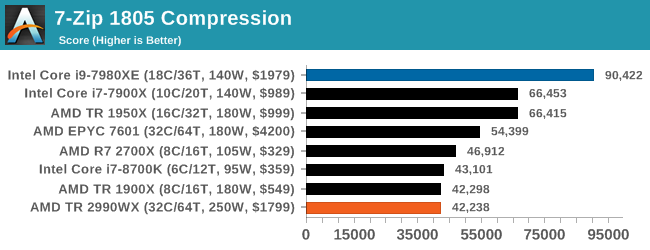
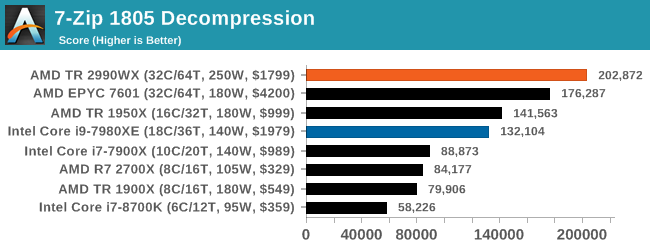
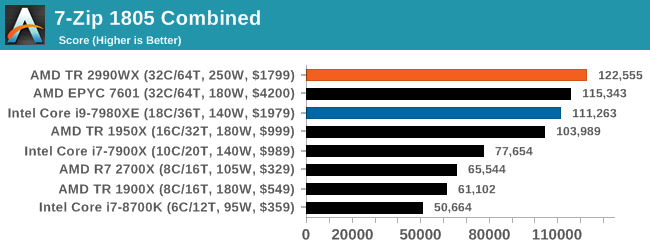
Oh boy, this was an interesting set of tests. When we initially published this review, without commentary, the compression graph with the 2990WX at the bottom was shared around social media like crazy, trying to paint a picture of why AMD performance isn’t great. It was also used in conjuction with Phoronix’s tests, that showed a much better picture on Linux.
But what confuses me is that almost no-one also posted the decompression graph. Here AMD’s 32-core processors take a commanding lead, with the 16/18-core parts being the best of the rest.
If you plan to share out the Compression graph, please include the Decompression one. Otherwise you’re only presenting half a picture.
WinRAR 5.60b3: Archiving Tool
My compression tool of choice is often WinRAR, having been one of the first tools a number of my generation used over two decades ago. The interface has not changed much, although the integration with Windows right click commands is always a plus. It has no in-built test, so we run a compression over a set directory containing over thirty 60-second video files and 2000 small web-based files at a normal compression rate.
WinRAR is variable threaded but also susceptible to caching, so in our test we run it 10 times and take the average of the last five, leaving the test purely for raw CPU compute performance.
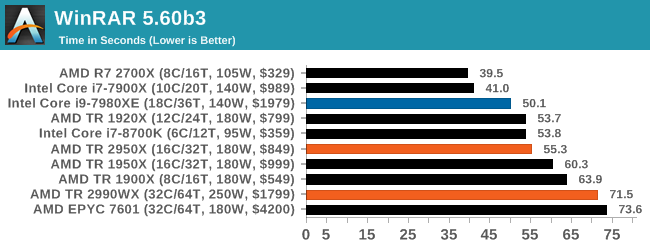
A set of high frequency cores and good memory is usually beneficial, but sometimes some more memory bandwidth and lower latency helps. At the top is AMD’s R7 2700X, with the Intel 10-core just behind. I’m surprised not to see the 8700K in there, perhaps its six cores is not enough. But the higher core count AMD parts struggle to gain traction here, with the 32-core parts taking some sweet time to finish this test.
AES Encryption: File Security
A number of platforms, particularly mobile devices, are now offering encryption by default with file systems in order to protect the contents. Windows based devices have these options as well, often applied by BitLocker or third-party software. In our AES encryption test, we used the discontinued TrueCrypt for its built-in benchmark, which tests several encryption algorithms directly in memory.
The data we take for this test is the combined AES encrypt/decrypt performance, measured in gigabytes per second. The software does use AES commands for processors that offer hardware selection, however not AVX-512.
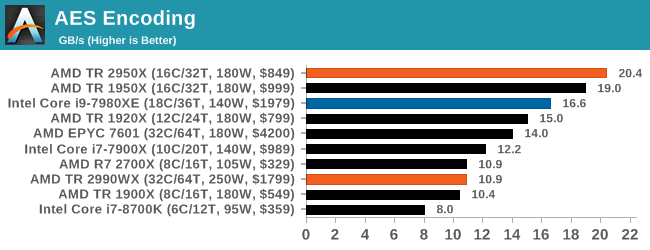
Normally we see this test go very well when there are plenty of cores, but it would seem that the bi-modal nature of the cores and memory controllers in the 2990WX gives a poor result. The EPYC 7601, with eight memory controllers, does a better job, however the 1950X wins here. The 2950X, where all cores have a similar access profile, scores top here, well above Intel’s 18-core Core i9.










171 Comments
View All Comments
HStewart - Monday, August 13, 2018 - link
"I highly highly doubt that Intel would postpone 10nm just to “shut down AMD""Probably right - AMD is not that big of threat in the real world - just go in to BestBuy - yes they have some game machines. a very few laptops including older generations
Spunjji - Tuesday, August 14, 2018 - link
That is some impressive goalpost moving that you just did *on your own claim*.Intel's issues have nothing to do with AMD, but they will allow a resurgent AMD to become more competitive over time. Pointing to how little of a threat AMD are *right now* and/or making up weird conspiracy theories that place Intel as the only mover and shaker in the entire industry won't change that.
Relic74 - Wednesday, August 29, 2018 - link
Consumer based computers is but a small portion of the market. Servers, millions of them needed every year to fill the demand needed by, well, everyone who hosts a site, government, networking farms a mile long, etc. The server market is huge and is growing almost faster than tech companies can provide. It's why I always thought Apple getting out if the server market was kind of a stupid ideal. All of the servers they ever created were sold before they were even created. I guess the margains were to small for them, greedy bastards. Why only make double the profits when you make 5x with consumer products. Seriously, an iPhone X costs less than $200 to make now, it used to be $250 but now its $200, greedy bastards. Oh, did you know it costs Apple less than $3 to go from 64GB to 128GB, ugh.Ozymankos - Sunday, January 27, 2019 - link
it matters what you consider as costsdo you calculate the shipping costs,the marketing costs,the salaries of everyone involved,the making of new facilities?
Eastman - Tuesday, August 14, 2018 - link
Intel isn't finished. They are still king of single thread performance. We will see if Zen 2 will surpass Intel's single thread performance.seanlivingstone - Monday, August 13, 2018 - link
Do you know that Jensen Huang is Lisa Su's uncle? Intel is done.f1nalpr1m3 - Thursday, October 25, 2018 - link
Expected Results vs Actual:Stats Expected Q3 2018 Results Actual Q3 2018 Results
Revenue($B) $18.1 $19.2
EPS $1.15 $1.40
UnNameless - Tuesday, August 14, 2018 - link
Sadly this is true. AMD tries hard and in the most part succeeds. Intel frankly showed some kind of panic for the niche market of top end processors with that chilled fiasco of a 5 GHz CPU. This means AMD puts quite some pressure onto themOutlander_04 - Tuesday, August 14, 2018 - link
AMD have bounced back very quickly . Mostly because people are starting to accept how over priced intel have beenhttps://wccftech.com/intel-coffee-lake-amd-ryzen-c...
twtech - Wednesday, August 15, 2018 - link
I don't think branding issues is going to stop purchases of AMD chips when they are the best fit for a particular use-case, but the lack of direct access to memory for half of the cores in the 2990wx is going to keep it from being the knockout punch for HEDT that it could have been.Looking at these benchmark results, that has seriously gimped the performance of the 32-core TR to the point where it is slower than the 16 core in some threaded workloads.
Sure, you can just go ahead and buy the 16-core 2950x instead, but then you're reduced back to being in 7980xe territory - albeit at a cheaper price point - but the point is, it's not the clear win that a relatively high clocked 32-core CPU probably could have been without the memory access issue.